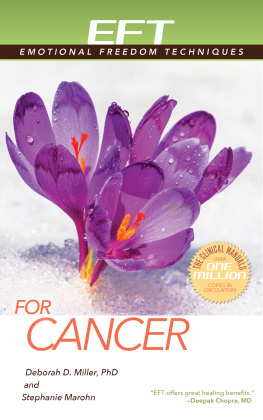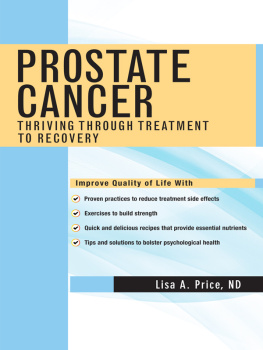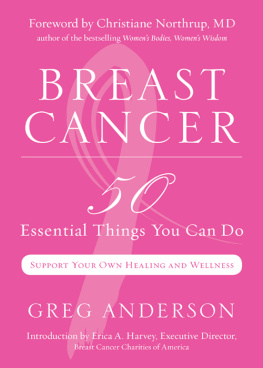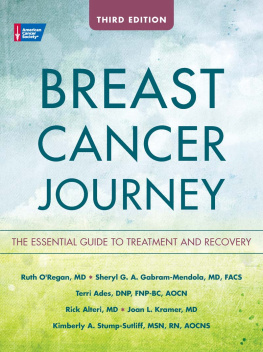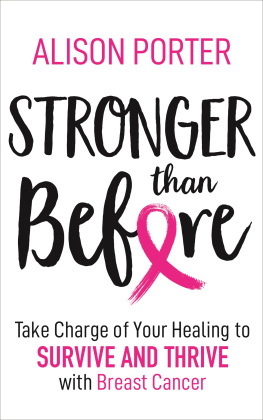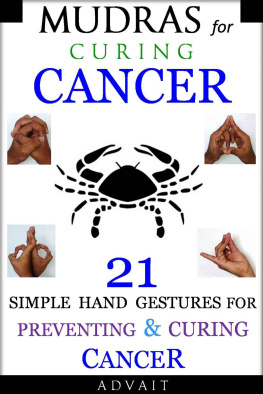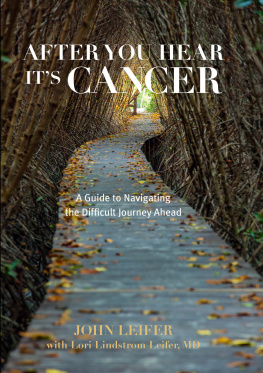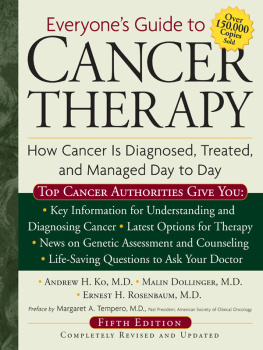Energy Psychology Press
3340 Fulton Rd., #442, Fulton, CA 95439
www.EnergyPsychologyPress.com
www.EFTUniverse.com
Library of Congress Cataloging-in-Publication Data
Name: Miller, Deborah D., author | Marohn, Stephanie, author.
Title: EFT for Cancer.
Identifier: ISBN 9781604152784 (ebook);
9781604152777 (pbk. book).
Subjects: LCSH: Energy Psychology. | Emotional Freedom Techniques | Self-care, Health. | Stress Management. | Emotion-focused therapy. | Cancer.
Copyright 2021 Dawson Church
This book demonstrates an impressive personal improvement tool. It is not a substitute for training in psychology or psychotherapy. The authors urge the reader to use these techniques under the supervision of a qualified therapist or physician. The authors and publisher do not assume responsibility for how the reader chooses to apply the techniques herein. The ideas, procedures, and suggestions in this book are not intended as a substitute for consultation with your professional health care provider. If you have any questions about whether or not to use EFT, consult your physician or licensed mental health practitioner. The information in this book is of a general nature only and may not be used to treat or diagnose any particular disease or any particular person. Reading this book does not constitute a professional relationship or professional advice or services. No endorsement or warranty is explicit or implied by any entity connected to this book, and there is no guarantee that you will have the same results.
All rights reserved. No part of this publication may be reproduced, stored in a retrieval system, or transmitted in any form or by any means, electronic, mechanical, photocopy, recording, or otherwise, without prior written permission from Energy Psychology Press, with the exception of short excerpts used with acknowledgment of publisher and authors.
eBook ISBN: 978-1-6041-5278-4
Important note: While EFT (Emotional Freedom Techniques) has produced remarkable clinical results, it must still be considered to be in the experimental stage and thus practitioners and the public must take complete responsibility for their use of it. Further, the authors are not licensed health professionals. Readers are strongly cautioned and advised to consult with a physician, psychologist, psychiatrist, or other licensed health care professional before utilizing any of the information in this book. The information is based on information from sources believed to be accurate and reliable and every reasonable effort has been made to make the information as complete and accurate as possible, but such completeness and accuracy cannot be guaranteed and is not guaranteed.
The authors, publisher, and contributors to this book, and their successors, assigns, licensees, employees, officers, directors, attorneys, agents, and other parties related to them (a) do not make any representations, warranties, or guarantees that any of the information will produce any particular medical, psychological, physical, or emotional result; (b) are not engaged in the rendering of medical, psychological, or other advice or services; (c) do not provide diagnosis, care, treatment, or rehabilitation of any individual; and (d) do not necessarily share the views and opinions expressed in the information. The information has not undergone evaluation and testing by the United States Food and Drug Administration or similar agency of any other country and is not intended to diagnose, treat, prevent, mitigate, or cure any disease. Risks that might be determined by such testing are unknown. If the reader purchases any services or products as a result of the information, the reader or user acknowledges that the reader or user has done so with informed consent. The information is provided on an as is basis without any warranties of any kind, express or implied, whether warranties as to use, merchantability, fitness for a particular purpose, or otherwise.
The authors, publisher, and contributors to this book, and their successors, assigns, licensees, employees, officers, directors, attorneys, agents, and other parties related to them (a) expressly disclaim any liability for and shall not be liable for any loss or damage including but not limited to use of the information; (b) shall not be liable for any direct or indirect compensatory, special, incidental, or consequential damages or costs of any kind or character; (c) shall not be responsible for any acts or omissions by any party including but not limited to any party mentioned or included in the information or otherwise; (d) do not endorse or support any material or information from any party mentioned or included in the information or otherwise; and (e) will not be liable for damages or costs resulting from any claim whatsoever. The within limitation of warranties may be limited by the laws of certain states and/or other jurisdictions and so some of the foregoing limitations may not apply to the reader who may have other rights that vary from state to state. If the reader or user does not agree with any of the terms of the foregoing, the reader or user should not use the information in this book or read it. A reader who continues reading this book will be deemed to have accepted the provisions of this disclaimer.
Please consult qualified health practitioners regarding your use of EFT.
Cancer no longer carries an automatic death sentence. Not so long ago, it did. With the advent of the understanding of cancer as a multifactorial condition and the possibility of influencing the prognosis by addressing contributing factors through integrative medicine and self-care, the outlook has changed. If you are reading this book, then you are interested in self-care and the effects it can have on your prognosis or the prognosis of a loved one.
Today, it is possible to heal from cancer if you practice self-care along with the medical treatments you decide are appropriate for you. In addition to implementing health-promoting changes in your lifestyle, essential steps in self-care are stress management, freeing yourself from the energetic and physical effects of old traumas, reducing limiting beliefs and negative thinking, and learning how to manage disturbing emotions and enhance positive ones.
Emotional Freedom Techniques (EFT), commonly called tapping, is a simple self-care method that uses tapping on acupressure points to help you accomplish all this and assist you in every aspect of your journey to health including: handling a cancer diagnosis, alleviating physical pain, navigating treatment options, reducing side effects of chemotherapy and other interventions, and coping with the changes to your self-image, energy level, relationships, work, and all the other shifts that occur in your life after you learn you have cancer.
Case histories throughout this book will show you how people have used EFT to address these and other facets of a life impacted by cancer. Tapping guides in each chapter from onward will provide you with sample tapping language.
Having a method at your fingertips to alleviate pain from cancer itself or from treatment obviously improves your quality of life. In numerous clinical studies, EFT has proven effective at reducing pain; one study showed a reduction of 57% (e.g., Bach et al., 2019). At the end of this chapter, youll have a chance to try tapping on any pain or physical discomfort you are feeling at the moment and see for yourself how EFT works. First, because a diagnosis of cancer brings up myriad disturbing emotions and feeling upset worsens physical pain, lets consider the part that emotions play in cancer.

